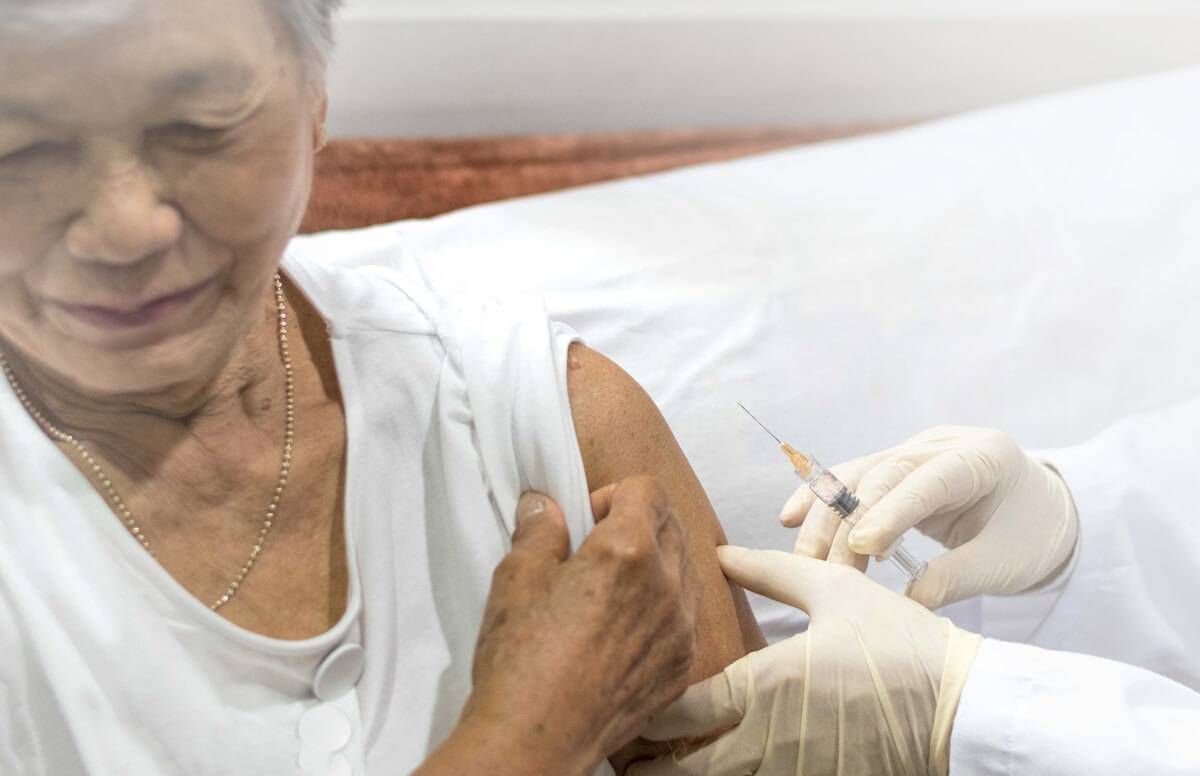Pneumonia Vaccine: How Things May Change for People 65+
What a government panel recommended to the CDC about the PCV-13 vaccine
(An update on the May 2019 Next Avenue story, below, about a potential change in the rules about a pneumonia vaccine: On Wednesday, June 26, a key U.S. government panel recommended the Centers for Disease Control and Prevention — the CDC — change its previous recommendation that all adults over 65 get an advanced vaccine against pneumonia. The advisory group instead recommended that a physician and a patient age 65 or older decide together whether the patient should get the PCV-13 vaccine. The author of the original story, elder advocate Bob Blancato, says: "This decision was a classic compromise — between continuing the existing recommendation and no longer recommending it. But as with any compromise, there could be consequences. Here, the most serious one would be any decision by the government's Centers for Medicare and Medicaid Services — CMS — to stop or limit Medicare coverage of the PCV-13 vaccine. If that happens, it will slow the trend of more older adults getting vaccinated and exacerbate the disparity of older minority groups being covered at a lower rate than non-minorities. The focus now shifts to CMS.")

Here is the original story published in May 2019:
Older adults contracting pneumonia (medical term: pneumococcal disease) have been in the news lately. First, Rock and Roll Hall of Fame artist Stevie Nicks, 70, contracted pneumonia and had to cancel a tour. Then, the legendary star of films and music, Doris Day, succumbed to pneumonia at 97. In addition, we’re in the midst of one of the longest flu and pneumonia seasons on record, according to the Centers for Disease Control and Prevention (CDC).
Against this backdrop looms the date of June 26, the day when the CDC’s Advisory Committee on Immunization Practices (ACIP) holds its next meeting. Why is that important? By the end of that day, the committee may take a vote which could lead to a more expensive pneumonia vaccine and to more older adults contracting pneumonia.
Background on Coverage for a Pneumonia Vaccine
Here’s why:
In 2014, the ACIP, after receiving testimony from me (I'm an AARP board member and past chair of the American Society on Aging) and other elder advocates, voted to recommend Medicare coverage of a more advanced pneumococcal vaccine than the program had been covering — PCV-13. Just a few months after this decision, the government’s Centers for Medicare and Medicaid Services (CMS) agreed to provide Medicare coverage for the new vaccine, in addition to coverage it had been allowing for the other pneumonia vaccine — the PPSV23 pneumococcal polysaccharide vaccine.
Older adults would be given a choice — either pay for the vaccine out of pocket (as much as $200 per dose) or not to get it at all.
But now, the ACIP is considering scrapping its earlier recommendation. Exactly why is hard to say; the panelists are cloaked in secrecy at the moment. But based on comments made at the February meeting by ACIP members, issues that will be under discussion include: whether the vaccine is cost-effective, the seriousness of potential side effects and reimbursement for the vaccine.
What a Public Policy Reversal Could Mean
If the ACIP votes against Medicare coverage of the PCV-13 pneumonia vaccine, the next step could be a CMS ruling saying Medicare Part B would no longer cover it. Then, older adults would be given a choice — either pay for the vaccine out of pocket (as much as $200 per dose) or not to get it at all. This could also mean the end of private insurance coverage for the vaccine, especially if doctors stop discussing it as an option with their patients.
A reversal by ACIP would pose a clear and direct threat to older adult health. Recent CDC data indicated that there are more than 48,000 deaths and 257,000 emergency room visits each year from pneumonia.
Any loss of Medicare coverage for this pneumonia vaccine will especially impact older adults in minority groups, who contract pneumonia at a higher rate than others and are less likely to be vaccinated. Coverage rates among older African Americans and Hispanics are roughly 20% lower than among non-Hispanic white older adults.
What Congress Has Said About the Pneumonia Vaccine
It should be noted that Congress is already on record expressing its views on the importance of pneumococcal vaccine coverage and concern about the underutilization of pneumococcal vaccinations for adults, including high-risk adults. The FY 2020 Labor-Health and Human Services-Education Appropriations bill passed by the House Appropriations Committee included language about it. The bill also calls on the CDC “to work toward achievement of the Healthy People 2020 goals to reduce invasive pneumococcal infections and increase the percentage of adults (age 65 and older) who are vaccinated against pneumococcal disease.”
On June 26, I will travel to Atlanta to again testify before the ACIP. I will say: “You made the right decision for the right reasons in 2014. What could have possibly changed to prompt a reversal? Hasn’t your decision actually saved Medicare money if it has prevented pneumonia cases among older adults?”
Should the ACIP reverse itself, this might lead to stronger language in a final Labor-HHS-Education funding bill. Also, advocacy efforts would then focus on the CDC Director Dr. Robert Redfield and CMS Administrator Seema Verma. Advocates would also work with Congress to try averting the loss of the coverage.
Advocates will take their best shot so access to the best shot for an older adult to avoid pneumonia won’t be taken away.

